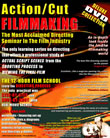|
|
FEATURES
- Writing Treatments That Sell
Page 2
|
 |
|
|
|
|
|
|
|
|
| Sponsors |

|
|
|
 |
|
 |

|
|
Writing Treatments
That Sell
|

|
The treatment must set the mood of the film. Finally, the treatment must introduce all the main and supporting characters that will have a crucial role in the film. Describing scenes and where extras are to be placed in unnecessary. This will most likely be taken care of by the director once the film is put into production. Treatments always contain the essential characters, structure and content of every scene from the very beginning to the very end of the given story. Once you have written out the treatment, it is important to see that every scene keeps the plot moving continuously forward.
It is also important to note that if the action of the story doesn't present itself early on in the treatment (within the first couple of paragraphs), generally the person evaluating the treatment will cease reading it.
There are two kinds of action in a treatment. The first is something that happens to a major character that will result in moving the story forward. The second type of action is dialogue that moves the story forward. In general, the more the story keeps the audience edge of their seats and the more suspense the story contains, the better the picture will be.
|

|

|
|
|
The best stories show the growth and changes of the protagonist
throughout
|
|

|
|
A good treatment wastes not a single word pulling you into the world of the story and involving you in the protagonist's conflicts. It's essential to intrigue the reader with your opening words so they will want to know what's going to happen next.
Whether you are writing a story of action, comedy, sci-fi or dramatic genre, you must begin by focusing on the characters. The characters are hands down the most important element of any story and should generate the action, setting and point of view throughout the treatment.
The best stories show the growth and changes of the protagonist throughout. Stories in which the main character goes through little to no changes from beginning to end are generally poorly constructed and not worth a second look. A convincing main character is four-dimensional: his makeup clearly focused on his motivation, his story's mission, the obstacles he faces, and the changes he undergoes.
Finally, when the story is complete, stop. Do not try to drag out the ending by adding additional, unneeded verbiage that will only take away from the fulfilling outcome you have created. As stated by Atchity and Wong, if your career goal is not only to find ideas but also to sell them, you must begin to see everything through a storyteller's lens.
Begin to perceive life's ups and downs from a dramatic point of view. Everywhere and anywhere, in the media and in your daily existence, always ask the question, "could this be a movie?" The best stories aren't invented. They're discovered, then retold from the storyteller's unique viewpoint.
|
|

|
|
|
FilmMakers
recommendations
ACTION
CUT - This is the most unique series of learning tools in the
film industry that provides an in-depth look inside the directing craft on a
step-by-step, shot-by-shot professional level of production from the written
page through the moviemaking process to the final film.
Writing Treatments That Sell: How to Create and Market Your Story Ideas to the Motion Picture and TV Industry
by Kenneth Atchity and Chi-Li Wong
The Big Deal : Hollywood's Million-Dollar Spec Script Market
by Thom Taylor
Developing Story Ideas
by Rabiger, Michale
|
|
|
|
|
|
|
|

|
|
|

|

|
|
top of page
|
Home
Page |
Contests
| Indies
| Features
| News
| Resource
Links
| Advertise
With Us |
Important
disclaimer
Copyright ©
1999-2011 by FilmMakers.com. All rights reserved.
FilmMakers.com
is a division of Media Pro Tech Inc.
|

|
|
|